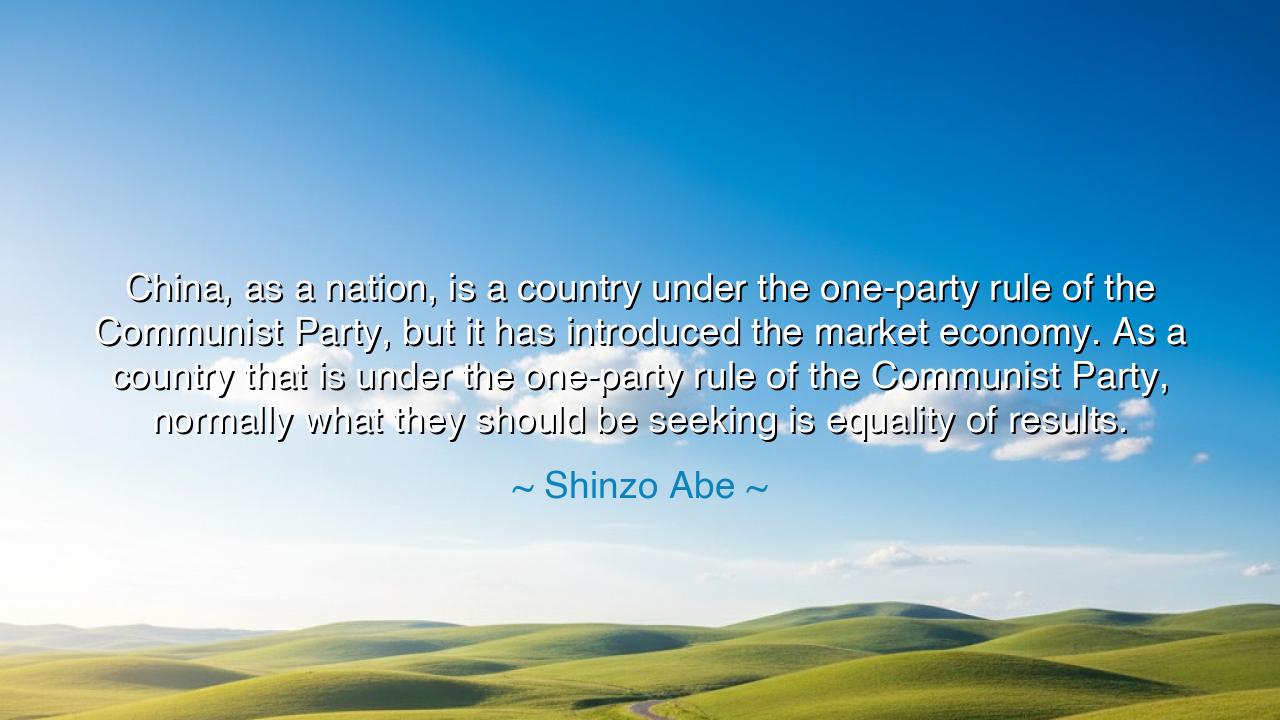
China, as a nation, is a country under the one-party rule of the
China, as a nation, is a country under the one-party rule of the Communist Party, but it has introduced the market economy. As a country that is under the one-party rule of the Communist Party, normally what they should be seeking is equality of results.






In the words of Shinzo Abe, “China, as a nation, is a country under the one-party rule of the Communist Party, but it has introduced the market economy. As a country that is under the one-party rule of the Communist Party, normally what they should be seeking is equality of results.” These words are both observation and warning, a meditation on the paradox of a state that clings to ideology while embracing the forces of commerce. Abe, a leader seasoned by history and rivalry, saw in China a tension that speaks to the heart of politics itself: the struggle between ideals and outcomes, between promises of equality and the unequal fruits of markets.
The Communist Party, by its origin and creed, was built upon the vision of equality of results—that no person should stand above another in wealth or privilege, and that the gains of labor should be shared among all. Such was the dream of Marx and Lenin, that the worker would be freed from exploitation, and society would be leveled into harmony. Yet, as Abe reminds us, China has also embraced the market economy, a system that thrives not on equality of results but on competition, difference, and hierarchy of success. Here lies the paradox: a nation that wears the robe of communism but feeds on the fire of capitalism.
History gives us clear mirrors of this contradiction. The Soviet Union, too, claimed equality of results, yet built an elite class of party officials who enjoyed privileges denied to the common worker. Rome, in its later days, spoke of republican virtue while embracing the decadence of empire. In each case, ideals proclaimed to the people diverged from realities lived by the rulers. Abe’s words call us to see that China, by embracing markets, has opened the gates to wealth, innovation, and prosperity—but also to inequality, disparity, and division that run against its founding creed.
The heart of Abe’s statement lies in the contrast between principle and practice. If the Communist Party were to remain true to its roots, it would strive for equality of results, redistributing gains so that no one would rise too high or fall too low. But in the pursuit of growth, the party tolerates vast inequalities: cities of towering glass and steel beside villages of poverty, billionaires rising while millions struggle. This dissonance exposes the truth that ideology alone cannot contain the forces unleashed by the market economy.
The ancients would have seen this as the danger of imbalance. Confucius taught that harmony comes when rulers act with virtue and fairness, ensuring stability among the people. Plato warned that every state is destroyed when the gap between rich and poor becomes too great, when the city ceases to see itself as one body. Abe’s words stand in this tradition: the acknowledgment that systems must align with their ideals, or else face fracture from within.
The lesson for us is both political and personal. Nations, like individuals, must beware of hypocrisy. To proclaim equality while tolerating inequality corrodes trust. To embrace the market while claiming communism creates confusion and contradiction. A society that cannot reconcile its ideals with its realities builds its house on shifting sand. The same is true in our own lives: if our words and actions do not align, we sow division in ourselves and in those around us.
Practical actions follow from this wisdom. Examine the systems you build, whether in governance, community, or family, and ensure they match the values you proclaim. Guard against extremes, for neither blind equality nor unchecked competition can sustain harmony alone. Seek balance between justice and growth, remembering that prosperity without fairness becomes corruption, and fairness without productivity becomes stagnation. And above all, hold leaders accountable to their ideals, lest they use ideology as a mask for power.
Thus, Shinzo Abe’s words endure as a reflection on one of the great paradoxes of our age. They call us to see that China’s one-party rule and its embrace of the market economy are not merely policies, but symbols of the tension between vision and reality, equality and prosperity, control and freedom. Let us then pass on this wisdom: that no society can thrive if it forgets its principles, and no people can prosper if they are deceived by words that do not match deeds. For harmony is born only when ideals and actions walk together as one.






AAdministratorAdministrator
Welcome, honored guests. Please leave a comment, we will respond soon